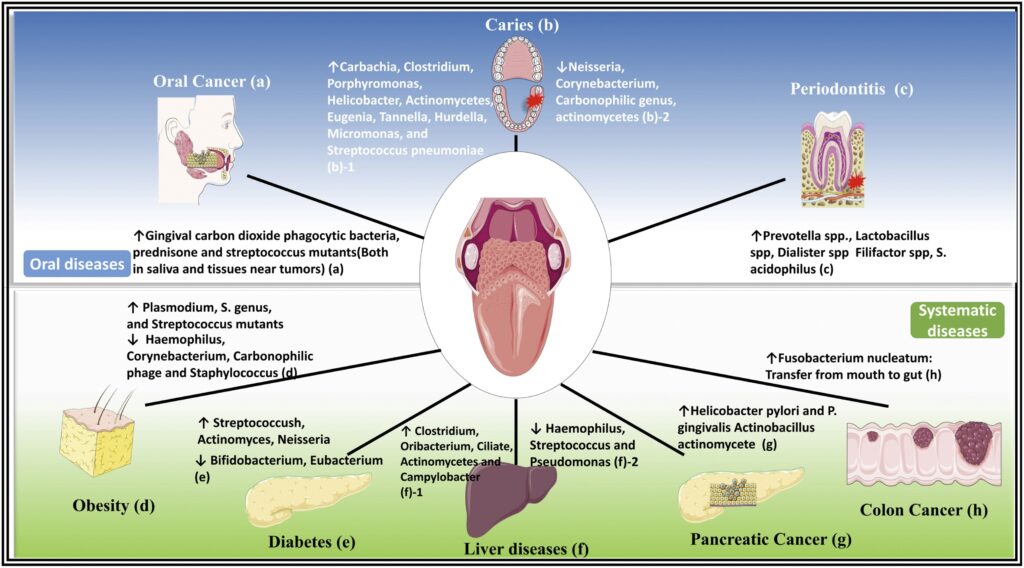Power of the Oral Microbiome and Salivary Diagnostics: Unlocking the Oral-Systemic Health Connection with Functional Dentistry
Functional dentistry recognizes that the oral microbiome is not merely a collection of bacteria but a complex ecosystem of microorganisms that play a vital role in our health (Deo 2019). A balanced oral microbiome helps maintain healthy teeth, gums, and oral tissues while contributing to overall systemic well-being (Peng 2022).
When the oral microbiome is in a state of imbalance, it can lead to various oral health conditions. For example, an overgrowth of harmful bacteria such as Streptococcus mutans can contribute to tooth decay, while an overabundance of certain keystone pathogenic species such as Porphyromonas gingivalis may contribute to gum disease (Darveau 2012). Additionally, an imbalanced oral microbiome can result in bad breath, compromised immune function, Diabetes, Pancreatic cancer, Colon Cancer, Cardiovascular disease, Alzheimer’s Disease, Dementia, Low birthweight and early-term birth (Sudhakara 2018).

Salivary Diagnostics in Functional Dentistry:
In functional dentistry, salivary diagnostics offer an exciting avenue for gaining deeper insights into the oral microbiome and identifying imbalances or dysbiosis. Two types of salivary diagnostics commonly used in functional dentistry are genomic-based diagnostics and mRNA-based diagnostics. Each type has its own strengths and weaknesses, and understanding these differences can help functional dentists make informed decisions when selecting the most appropriate test for their patients.
Genomic-based diagnostics analyze the DNA of microorganisms present in saliva. This approach can provide a wealth of information about the composition of the oral microbiome, including the types and quantities of different microorganisms present. Genomic-based diagnostics can identify specific bacteria associated with oral diseases such as periodontitis and dental caries, as well as provide information about the genetic characteristics of these microorganisms. This information can be valuable for identifying potential treatment targets and tracking the progress of treatment over time.
However, genomic-based diagnostics do have some limitations. For example, they are not always able to distinguish between live and dead microorganisms, which can affect the accuracy of the test results. Additionally, genomic-based diagnostics may not always provide information about the activity of the microorganisms present in the oral microbiome, which is an important consideration when designing treatment plans.
In contrast, mRNA-based diagnostics focus on the activity of the microorganisms present in saliva. This approach measures the expression of genes in the microorganisms, which can provide valuable information about their metabolic activity and potential for virulence. mRNA-based diagnostics can identify microorganisms that are actively causing disease, as well as provide information about the response of the oral microbiome to treatment.
One of the main advantages of mRNA-based diagnostics is their ability to identify active microorganisms, which can provide more clinically relevant information compared to genomic-based diagnostics. Additionally, mRNA-based diagnostics can be used to monitor the response of the oral microbiome to treatment, providing valuable insights into the effectiveness of different interventions.
However, mRNA-based diagnostics also have some limitations. For example, they require a more complex and expensive testing process compared to genomic-based diagnostics. Additionally, mRNA-based diagnostics may not always be able to detect low levels of gene expression, which can limit their sensitivity.
In summary, both genomic-based diagnostics and mRNA-based diagnostics have their own strengths and weaknesses in functional dentistry. Genomic-based diagnostics can provide a detailed understanding of the composition of the oral microbiome, while mRNA-based diagnostics can provide valuable insights into the metabolic activity of microorganisms and the response of the oral microbiome to treatment. We use these tests in conjunction with other diagnostic tools to develop personalized treatment plans for our patients and optimize their oral and systemic health. In the office, we utilize both types of testing. For those looking for an at-home solution, we recommend Bristle. Please learn more about this test at www.bristlehealth.com. To save 15% off, please use the code “DRJENCHIANG15”.
Harnessing the Power of Probiotics in Functional Dentistry:
In functional dentistry, the use of probiotics offers an exciting avenue for optimizing oral health and rebalancing the oral microbiome. Probiotics are live microorganisms that, when administered in adequate amounts, provide a range of health benefits. By introducing beneficial strains of bacteria, functional dentists can help restore microbial balance, inhibit the growth of harmful bacteria, and enhance overall oral health (Matsubara 2016).
Probiotics can be administered in various forms, including oral supplements, lozenges, mouthwashes, and even specific food items. Functional dentists can guide patients in selecting the most suitable probiotic strains based on individual needs, taking into account factors such as oral health conditions, diet, and lifestyle (Ishikawa, 2020).
Schedule a Consultation :
Ready to explore the world of functional dentistry and unlock the full potential of your oral microbiome? Take the first step by scheduling a consultation with a functional dentist. During your comprehensive evaluation, Dr. Chiang will assess your oral health, discuss your concerns, and perform a thorough analysis of your oral microbiome. Don’t miss this opportunity to optimize your oral and systemic health.
By collaborating with a functional dentist, you can gain a deeper understanding of your oral microbiome and the factors influencing its balance. The functional dentist will work with you to develop a customized plan that may include dietary adjustments, oral hygiene practices, and targeted probiotic interventions. This holistic approach will empower you to take control of your oral and systemic health.
Schedule a consultation with a functional dentist today to receive a comprehensive evaluation of your oral microbiome. Unlock the potential of functional dentistry in improving your oral and systemic health. Contact Jennifer Chiang, DDS, at 408-523-4030 or visit www.jenchiangdds.com to book your appointment now.
Recommended Additional Resources:
Podcast interview with Dr. B: Weed, feed, or seed the oral microbiome? Troubleshooting the oral microbiome with David Lin PhD (Episode #81)
Bristle Test To save 15% off, please use the code “DRJENCHIANG15”
